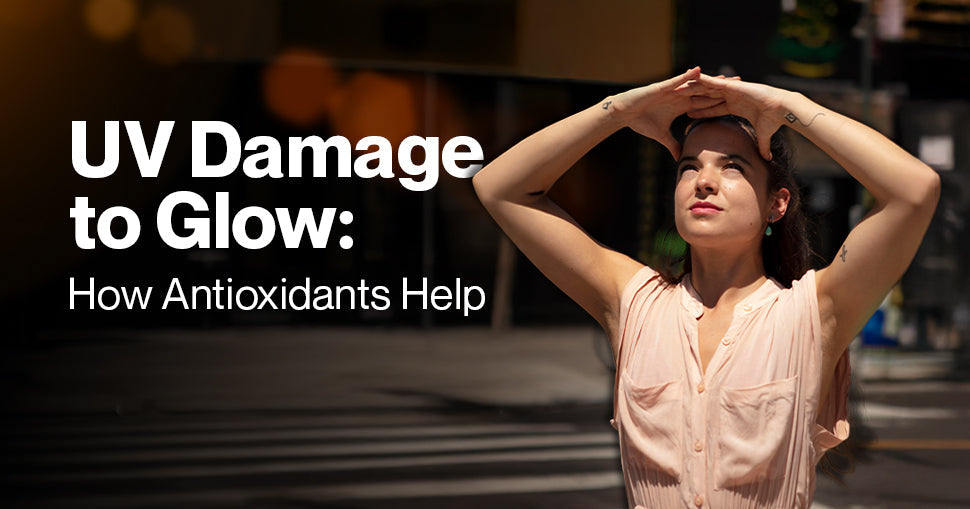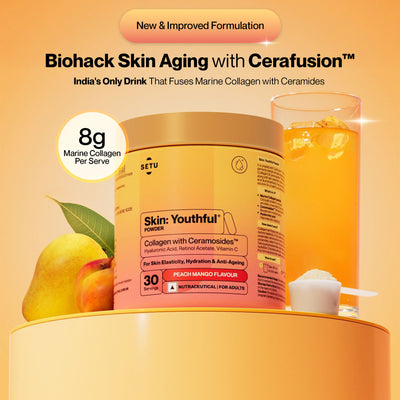From UV Damage to Glowing Skin: Why Antioxidants Are Your Skin's Best Friends
26 Aug 2025
In the quest for radiant, healthy skin, there's one group of compounds that consistently emerges as the ultimate skin savior: antioxidants. These powerful molecules aren't just buzzwords in the beauty industry—they're scientifically proven defenders that work tirelessly to protect, repair, and rejuvenate your skin from the inside out. Whether you're battling UV damage, fighting signs of aging, or simply seeking that coveted healthy glow, understanding how antioxidants for skin work can transform your entire approach to skincare.
The Science Behind Oxidative Stress and Skin Damage
To appreciate why antioxidants are so crucial for skin health, we need to understand the enemy they're fighting: oxidative stress. Every day, your skin faces an onslaught of environmental aggressors that generate harmful molecules called free radicals. These unstable molecules are missing an electron and desperately seek to steal one from healthy skin cells, creating a destructive chain reaction that damages cellular structures.
The primary culprits behind free radical formation include:
UV radiation from sun exposure remains the most significant threat to skin health. UVA rays penetrate deep into the dermis, breaking down collagen and elastin fibers that keep skin firm and elastic. UVB rays primarily affect the epidermis, causing sunburn and DNA damage that can lead to premature aging and skin cancer. This UV damage repair process requires a robust antioxidant defense system to neutralize the oxidative damage before it becomes permanent.
Pollution, cigarette smoke, stress, and even normal metabolic processes also contribute to free radical production. Over time, this accumulated oxidative damage manifests as fine lines, wrinkles, dark spots, uneven skin tone, and a loss of that youthful glowing skin we all desire.
How Antioxidants Provide Oxidative Stress Protection
Antioxidants work by neutralizing free radicals before they can cause cellular damage. They generously donate electrons to unstable molecules without becoming unstable themselves, effectively breaking the destructive chain reaction. This oxidative stress protection is your skin's first line of defense against environmental damage and premature aging.
Different skincare antioxidants work through various mechanisms:
Glutathione stands as the body's master antioxidant, often called the "mother of all antioxidants." This tripeptide compound works at the cellular level to neutralize free radicals and regenerate other antioxidants like vitamins C and E. Glutathione is particularly effective at protecting against UV damage repair because it directly scavenges harmful reactive oxygen species generated by sun exposure. As we age, natural glutathione levels decline, making supplementation and topical application increasingly important for maintaining optimal oxidative stress protection.
Vitamin C is perhaps the most celebrated antioxidant in skincare. As a potent free radical scavenger, it not only protects against oxidative damage but also stimulates collagen production, brightens skin tone, and helps fade dark spots. L-ascorbic acid, the most potent form of vitamin C, provides immediate protection while promoting long-term skin repair and skin radiance boost.
Vitamin E works synergistically with vitamin C, providing fat-soluble antioxidant protection that's particularly effective in cell membranes. It helps maintain skin barrier function and provides anti-inflammatory benefits that calm irritated skin.
Retinoids, including retinol and retinyl palmitate, offer dual benefits as both antioxidants and cell turnover accelerators. These anti-aging antioxidants help repair existing damage while preventing future oxidative stress.
Niacinamide, a form of vitamin B3, provides powerful antioxidant protection while also regulating oil production, minimizing pores, and improving skin texture. It's particularly effective for those dealing with acne-prone or sensitive skin.
Plant-Based Powerhouses for Skin Protection
Nature provides an abundance of potent antioxidants that have been used for centuries in traditional skincare practices. Modern science has now validated many of these botanicals, revealing their impressive protective and restorative properties.
Green tea extract contains catechins, particularly EGCG (epigallocatechin gallate), which provide superior protection against UV-induced oxidative stress. Studies show that topical application of green tea can reduce inflammation, prevent collagen breakdown, and even help repair DNA damage from sun exposure.
Grape seed extract is rich in proanthocyanidins, which are 20 times more potent than vitamin C and 50 times more potent than vitamin E. These compounds provide exceptional protection against environmental stressors while promoting healthy circulation and skin regeneration.
Pomegranate extract contains punicalagins and ellagic acid, which offer remarkable anti-inflammatory and protective benefits. Research suggests pomegranate antioxidants can help prevent UV-induced skin cancer while promoting skin renewal and elasticity.
Resveratrol, found in grape skins and red wine, has gained attention for its powerful anti-aging properties. It activates longevity genes called sirtuins, which help repair cellular damage and maintain healthy skin function as we age.
Building Your Antioxidant Skincare Routine
Creating an effective antioxidant skincare routine requires strategic layering and timing to maximize benefits. The key is combining topical applications with internal support for comprehensive protection.
Morning Protection Protocol: Start your day with a gentle cleanser that doesn't strip your skin's natural protective barrier. Follow with a vitamin C serum applied to clean, dry skin. Vitamin C is most effective when applied in the morning because it provides immediate protection against daily environmental stressors. Layer on a moisturizer containing additional antioxidants like vitamin E or niacinamide, then finish with broad-spectrum SPF 30 or higher sunscreen.
Evening Repair Routine: Nighttime is when your skin naturally repairs itself, making it the perfect time for more intensive antioxidant treatments. After cleansing, apply a serum containing retinoids or other anti-aging antioxidants. These ingredients work best at night when your skin isn't exposed to UV radiation. Follow with a rich moisturizer containing antioxidants like green tea extract or resveratrol to support overnight repair processes.
Internal Skincare: Antioxidant-Rich Supplements
While topical antioxidants provide direct protection to your skin's surface, internal skincare through antioxidant-rich supplements supports skin health from within. This inside-out approach ensures your skin receives comprehensive antioxidant protection at the cellular level.
Glutathione supplements are increasingly recognized as one of the most effective ways to boost your body's natural antioxidant defenses. Glutathione or reduced glutathione supplements (typically 250-500mg daily) can help maintain optimal levels as natural production declines with age. Many users report improved skin clarity, reduced hyperpigmentation, and enhanced glowing skin within 8-12 weeks of consistent supplementation.
Vitamin C supplements provide systemic antioxidant protection and support collagen synthesis throughout your body. The recommended daily intake for skin health is typically 500-1000mg, though individual needs may vary.
Astaxanthin, a powerful carotenoid found in algae and seafood, provides exceptional protection against UV-induced oxidative stress. Studies show that 4-6mg daily can significantly improve skin elasticity, moisture content, and overall appearance.
Coenzyme Q10 supports cellular energy production while providing antioxidant protection. As we age, our natural CoQ10 levels decline, making supplementation particularly beneficial for mature skin.
Omega-3 fatty acids, while not antioxidants themselves, support the effectiveness of antioxidant systems while maintaining healthy skin barrier function and reducing inflammation.
Lifestyle Factors That Enhance Antioxidant Effectiveness
Your daily habits significantly impact how effectively antioxidants can protect and repair your skin. Creating an antioxidant-friendly lifestyle amplifies the benefits of both topical and internal antioxidant therapies.
Dietary Choices: Consuming a rainbow of colorful fruits and vegetables ensures you're getting a diverse array of antioxidants. Berries, leafy greens, tomatoes, carrots, and citrus fruits are particularly rich sources. Dark chocolate, green tea, and red wine (in moderation) also provide beneficial compounds.
Hydration: Adequate water intake supports cellular function and helps transport antioxidants throughout your body. Aim for at least 8 glasses of water daily, more if you're active or live in a dry climate.
Sleep Quality: During sleep, your skin's natural repair processes are most active. Ensure you're getting 7-9 hours of quality sleep to allow antioxidants to work effectively in repairing daily damage.
Stress Management: Chronic stress increases free radical production and depletes your body's natural antioxidant reserves. Incorporate stress-reduction techniques like meditation, yoga, or regular exercise to support your skin's antioxidant systems.
The Long-Term Vision: Antioxidants as Preventive Medicine
The most compelling aspect of incorporating antioxidants into your skincare routine is their preventive power. While many skincare ingredients focus on treating existing damage, antioxidants work proactively to prevent future damage from occurring.
This preventive approach means that the earlier you start using antioxidants, the more dramatic your long-term results will be. However, it's never too late to begin. Even mature skin with existing damage can benefit significantly from comprehensive antioxidant protection.
Regular use of anti-aging antioxidants can slow the aging process, maintain skin elasticity, preserve even skin tone, and keep your complexion looking vibrant and healthy for years to come. The key is consistency and patience—antioxidant benefits compound over time, with the most dramatic improvements often visible after 3-6 months of dedicated use.
Conclusion: Your Path to Radiant, Protected Skin
Antioxidants truly are your skin's best friends, offering unparalleled protection against environmental damage while actively supporting repair and regeneration processes. By understanding how these powerful compounds work and implementing both topical and internal antioxidant strategies, you're investing in your skin's long-term health and beauty.
Remember that the most effective approach combines high-quality topical antioxidants with antioxidant-rich supplements like Setu Skin: Renew, healthy lifestyle choices, and consistent sun protection. This comprehensive strategy ensures your skin receives maximum protection against oxidative stress while maintaining the cellular health necessary for that coveted glowing skin.
Start building your antioxidant arsenal today, and watch as your skin transforms from damaged and dull to radiant and resilient. Your future self will thank you for the protection and care you provide today.
Skin: Renew - Glutathione - Orange Flavour
- ₹1,696
- ₹1,696
-
₹2,600 - ( 34% OFF)
Categories
- Choosing a selection results in a full page refresh.
- Press the space key then arrow keys to make a selection.
this is the sidecart












